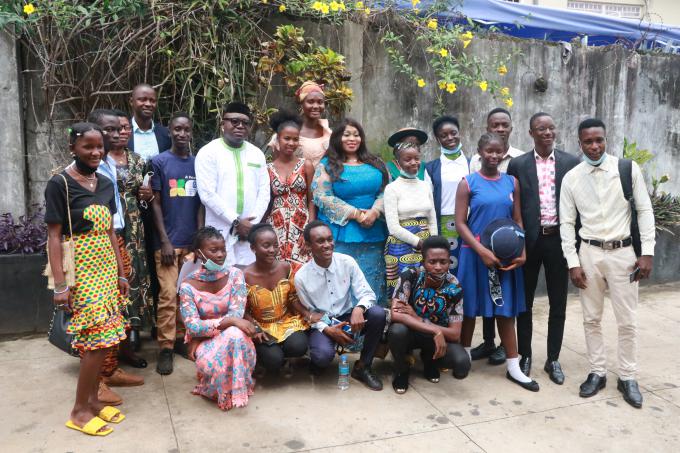National Children’s Conference on Day of the African Child
Wednesday, June 16,2021. The Children’s Forum Network in collaboration with Ministry of Gender and Children’s Affairs today held a virtual National Children’s Conference to commemorate Day of the African Child.
CFN representatives with Minister and Deputy Minister of Gender and Children's Affairs and ministry staff at MGCA, Freetown, June, 16,2021. Photo: Abdul Sillah, Save the Children
Participating were up to 50 CFN representatives from the regional headquarter towns of Pujehun, South; Kailahun, East; Port Loko, North and Waterloo, Western Area Rural. Stakeholders and partners included Minister of Basic Secondary School Education, Minister of Gender and Children’s Affairs, National Commission for Children, Child Rights Coalition, UNICEF and Save the Children.
Key messages from children:
Kailahun: Teenage pregnancy (SGBV), education and health were the key issues for them. On their last engagement with the One Stop Centre 126 girls had been raped. They said that despite the Sexual Offences Act, cases were still being compromised. They also called for free health care for all children under the age of 18 years.
Western Area Rural: Applauded progress made in child protection stating that they had noticed some improvement because of sensitization and better services like the One Stop Centre. They have also seen changes in education since the Free Quality Education initiative; a reduction in drop-out rates but called for more monitoring to ensure education remained ‘free’. Their main concern was child participation which is limited. They called for government to ensure children have a platform to air their views and play a part in decision making on issues affecting them.
Minister of Education responds:
In his response Dr David Sengeh focused on the progress made since the Free Quality Education initiative and the MBSSE inclusion policy. Since 2018 MBSSE have recruited 5,000 qualified teachers and in the process of recruiting a further 3,000. They have rehabilitated 100 schools, building more new schools as well as establishing early child education centres. The aim is to “ensure no one is left behind, hence the policy of radical inclusion.” Key components of this policy include: 1. Pregnant girls and parent learners (including boys who are parents) 2. Children with disabilities 3. Gender parity- to increase parity from 84-90 percent in three years and; 4. Access to education for remote and hard to reach areas. MBSSE are focused on comprehensive safety, increased access for all and quality teaching.
In their statement UNICEF called for the CRA under review to be explicit in declarations; for the age of marriage in CRA to be aligned with Sexual Offences Act and Customary Marriage and Divorces Act and; more budgetary allocations to MGCA and MSW.
 Sierra Leone
Sierra Leone 